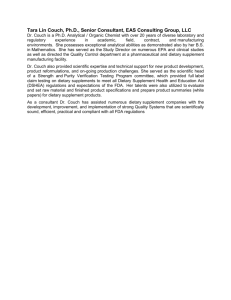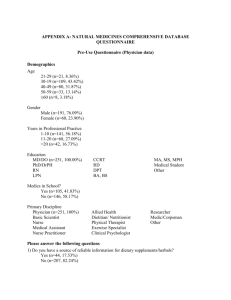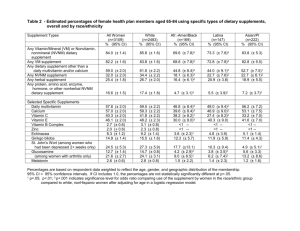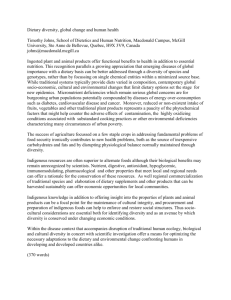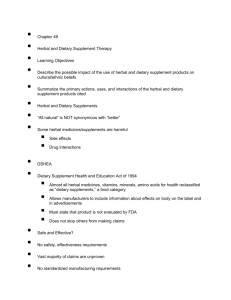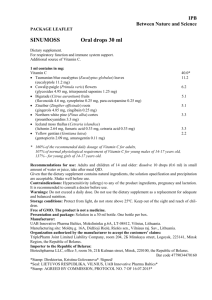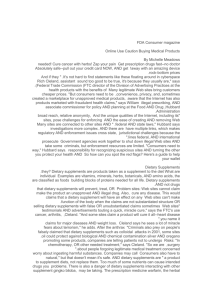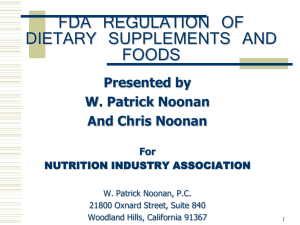Dear
advertisement
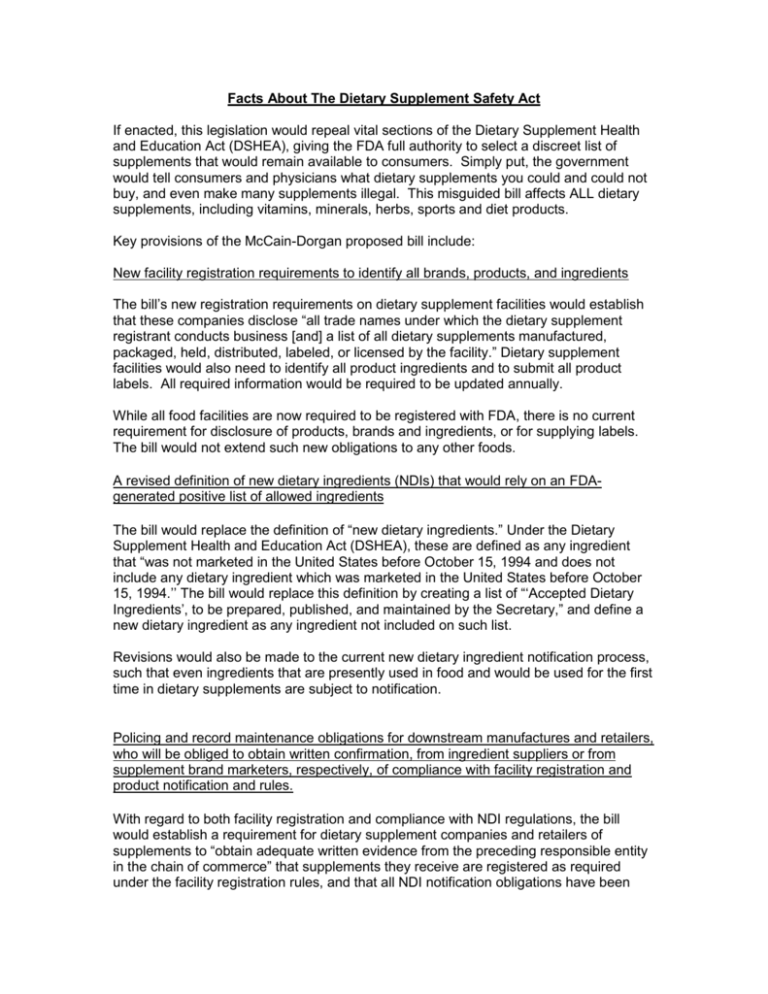
Facts About The Dietary Supplement Safety Act If enacted, this legislation would repeal vital sections of the Dietary Supplement Health and Education Act (DSHEA), giving the FDA full authority to select a discreet list of supplements that would remain available to consumers. Simply put, the government would tell consumers and physicians what dietary supplements you could and could not buy, and even make many supplements illegal. This misguided bill affects ALL dietary supplements, including vitamins, minerals, herbs, sports and diet products. Key provisions of the McCain-Dorgan proposed bill include: New facility registration requirements to identify all brands, products, and ingredients The bill’s new registration requirements on dietary supplement facilities would establish that these companies disclose “all trade names under which the dietary supplement registrant conducts business [and] a list of all dietary supplements manufactured, packaged, held, distributed, labeled, or licensed by the facility.” Dietary supplement facilities would also need to identify all product ingredients and to submit all product labels. All required information would be required to be updated annually. While all food facilities are now required to be registered with FDA, there is no current requirement for disclosure of products, brands and ingredients, or for supplying labels. The bill would not extend such new obligations to any other foods. A revised definition of new dietary ingredients (NDIs) that would rely on an FDAgenerated positive list of allowed ingredients The bill would replace the definition of “new dietary ingredients.” Under the Dietary Supplement Health and Education Act (DSHEA), these are defined as any ingredient that “was not marketed in the United States before October 15, 1994 and does not include any dietary ingredient which was marketed in the United States before October 15, 1994.’’ The bill would replace this definition by creating a list of “‘Accepted Dietary Ingredients’, to be prepared, published, and maintained by the Secretary,” and define a new dietary ingredient as any ingredient not included on such list. Revisions would also be made to the current new dietary ingredient notification process, such that even ingredients that are presently used in food and would be used for the first time in dietary supplements are subject to notification. Policing and record maintenance obligations for downstream manufactures and retailers, who will be obliged to obtain written confirmation, from ingredient suppliers or from supplement brand marketers, respectively, of compliance with facility registration and product notification and rules. With regard to both facility registration and compliance with NDI regulations, the bill would establish a requirement for dietary supplement companies and retailers of supplements to “obtain adequate written evidence from the preceding responsible entity in the chain of commerce” that supplements they receive are registered as required under the facility registration rules, and that all NDI notification obligations have been met. All received evidence of such compliance would be subject to FDA review and inspection. Extension of existing adverse event report (AER) requirements, such that even minor AERs would need to be submitted to FDA annually Dietary supplement marketers are currently required to submit serious adverse event reports to FDA within 15 days of receipt. The McCain legislation would also require annual submission of a compilation report of all adverse event reports. This provision would establish a requirement that is similar to the current law for prescription drugs. Marketers of conventional foods have no adverse event reporting requirements, even for serious adverse events. Obligations and authority for FDA with regard to removing products that present the risk tof serious adverse health consequences or death, or are adulterated or misbranded The bill would create a new responsibility for FDA to issue orders for a supplement company to cease distribution of any product for which FDA determines a “reasonable probability that a dietary supplement or a product marketed or sold as a dietary supplement would cause serious, adverse health consequences or death, or is adulterated or misbranded.” The agency would also be given mandatory recall authority. This new agency responsibility and authority now exists only for certain medical devices. Existing law allows for the government to ban illegal substances, remove adulterated product from the market, and ensure the safety of supplements. The addition of a steroid to a supplement makes it an unapproved or misbranded drug – not a supplement. FDA and the Drug Enforcement Agency (DEA) have full legal authority, if not the financial resources, to enforce current law and successfully combat this problem. Naturopathic doctors are the only physician-level experts on supplementation. It is essential that you contact your United States Senators today to share that expertise and ask them to oppose passage of this legislation. Naturopathic patients should also act today, and let their Senators know that your health is contingent on your ability to access the quality products recommended by your naturopathic doctor.
